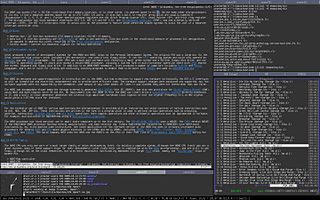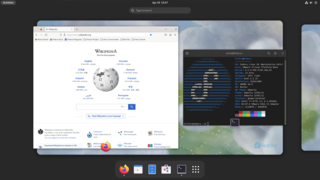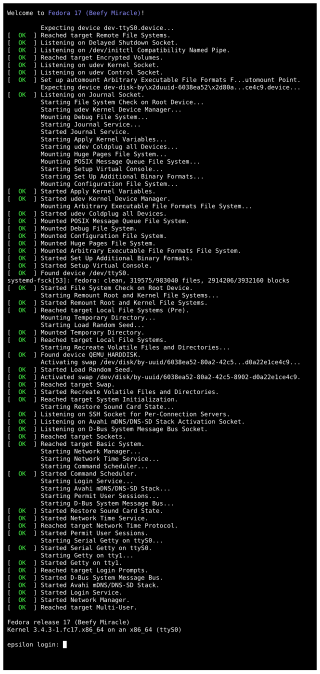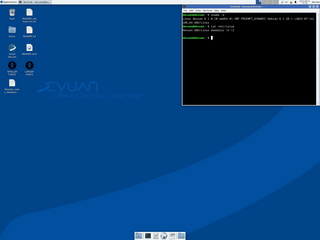
A Linux distribution is an operating system made from a software collection that includes the Linux kernel, and often a package management system. Linux users usually obtain their operating system by downloading one of the Linux distributions, which are available for a wide variety of systems ranging from embedded devices and personal computers to powerful supercomputers.

Source Mage is a Linux distribution. As a package is being installed, its source code is automatically downloaded, compiled, and installed. Source Mage is descended from Sorcerer.
In software engineering, version control is a class of systems responsible for managing changes to computer programs, documents, large web sites, or other collections of information. Version control is a component of software configuration management.
urpmi is a package management tool for installing, removing, updating and querying software packages of local or remote (networked) media. It wraps around the RPM Package Manager in the role of a smart package manager. It uses repositories and will resolve dependencies so that the user will not suffer from dependency hell that can happen when using RPM directly. It works with official sources from Mandriva or unofficial sources such as those from the Penguin Liberation Front. It has a graphical front-end: Rpmdrake.

In Unix computing, Ion is a tiling and tabbing window manager for the X Window System. It is designed such that it is possible to manage windows using only a keyboard, without needing a mouse. It is the successor of PWM and is written by the same author, Tuomo Valkonen. Since the first release of Ion in the summer 2000, similar alternative window management ideas have begun to show in other new window managers: Larswm, ratpoison, StumpWM, wmii, xmonad and dwm.

GNU arch software is a distributed revision control system that is part of the GNU Project and licensed under the GNU General Public License. It is used to keep track of the changes made to a source tree and to help programmers combine and otherwise manipulate changes made by multiple people or at different times.
In software development, distributed version control is a form of version control in which the complete codebase, including its full history, is mirrored on every developer's computer. Compared to centralized version control, this enables automatic management branching and merging, speeds up most operations, improves the ability to work offline, and does not rely on a single location for backups. Git, the world's most popular version control system, is a distributed version control system.
Branching, in version control and software configuration management, is the duplication of an object under version control. Each object can thereafter be modified separately and in parallel so that the objects become different. In this context the objects are called branches. The users of the version control system can branch any branch.
cdrtools is a collection of independent projects of free software/open source computer programs.

Compiz is a compositing window manager for the X Window System, using 3D graphics hardware to create fast compositing desktop effects for window management. Effects, such as a minimization animation or a cube workspace, are implemented as loadable plugins. Because it conforms to the ICCCM conventions, Compiz can be used as a substitute for the default Mutter or Metacity, when using GNOME Panel, or KWin in KDE Plasma Workspaces. Internally Compiz uses the OpenGL library as the interface to the graphics hardware.
In software development, version control is a class of systems responsible for managing changes to computer programs or other collections of information such that revisions have a logical and consistent organization. The following tables include general and technical information on notable version control and software configuration management (SCM) software. For SCM software not suitable for source code, see Comparison of open-source configuration management software.

Software remastering is software development that recreates system software and applications while incorporating customizations, with the intent that it is copied and run elsewhere for "off-label" usage. The term comes from remastering in media production, where it is similarly distinguished from mere copying.

Fedora Linux is a Linux distribution developed by the Fedora Project. It was originally developed in 2003 as a continuation of the Red Hat Linux project. It contains software distributed under various free and open-source licenses and aims to be on the leading edge of open-source technologies. It is now the upstream source for CentOS Stream and Red Hat Enterprise Linux.
IcedTea is a build and integration project for OpenJDK launched by Red Hat in June 2007. IcedTea also includes some addon libraries: IcedTea-Web is a free software implementation of Java Web Start and the Java web browser applet plugin. IcedTea-Sound is a collection of plugins for the Java sound subsystem, including the PulseAudio provider which used to be included with IcedTea. The Free Software Foundation recommends that all Java programmers use IcedTea as their development environment.
The Debian build toolchain is a collection of software utilities used to create Debian source packages (.dsc) and Debian binary packages from upstream source tarballs.

RPM Package Manager (RPM) is a free and open-source package management system. The name RPM refers to the .rpm file format and the package manager program itself. RPM was intended primarily for Linux distributions; the file format is the baseline package format of the Linux Standard Base.

Russian Fedora Remix was a remix of the Fedora Linux Linux distribution adapted for Russia that was active in 2008–2019. It was neither a copy of the original Fedora nor a new Linux distribution. The project aimed to ensure that Fedora fully satisfied the needs of Russian users with many additional features provided out of the box. In autumn 2019 the project was phased out because its leaders announced that it "had fulfilled its purpose by 100%" and all of the Russian-centric improvements were officially included in Fedora repositories, and Russian Fedora software maintainers became regular Fedora maintainers.

systemd is a software suite that provides an array of system components for Linux operating systems. The main aim is to unify service configuration and behavior across Linux distributions. Its primary component is a "system and service manager" – an init system used to bootstrap user space and manage user processes. It also provides replacements for various daemons and utilities, including device management, login management, network connection management, and event logging. The name systemd adheres to the Unix convention of naming daemons by appending the letter d. It also plays on the term "System D", which refers to a person's ability to adapt quickly and improvise to solve problems.

paldo is a Linux distribution. It was originally developed by Jürg Billeter and Raffaele Sandrini and released in 2004, mainly under the GNU GPL.

Devuan is a fork of the Debian Linux distribution that uses sysvinit, runit or OpenRC instead of systemd. Devuan aims to avoid "lock-in" by projects like systemd and aims to maintain compatibility with other init systems to avoid detaching Linux from other Unix systems.











